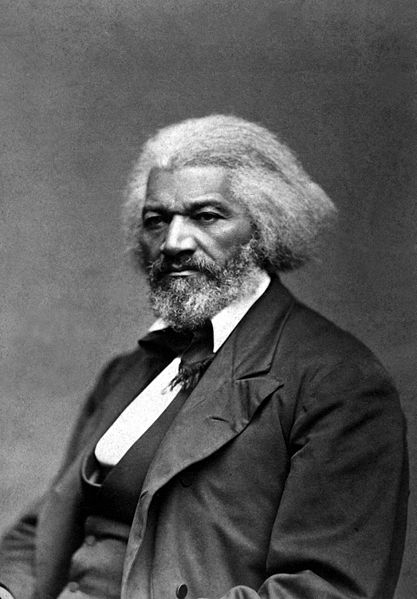I prefer to be true to myself, even at the hazard of incurring the ridicule of others, rather than to be false, and to incur my own abhorrence. – Frederick Douglass

Born a slave, and an abolitionist, when being one wasn’t cool. But he remained true to himself, and ignored the ridicule of others. Quite the role model, in my opinion. Do you agree?
What does that mean?
To me, this appears to be a variant of the old Shaksperian statement (from Polonius to Laertes in ‘Hamlet’ A1S3) “To thine own self be true.”
In this quote, he states that he would rather incur the ridicule of others than betray himself (and presumably his values). He would rather be true to himself, then pander to the wishes or norms of others. In a world that usually demands conformity, that’s a very bold statement.
He says that if he were to be false to himself, he would incur his own abhorrence, his own loathing of self. To me, this part of the quote explains why one should be true to yourself. Failing to honor your values, or your self, you betray your values and yourself. And that is truly something worthy of abhorrence.
To me, this quote is as useful today as it was nearly a century and a half ago. It applies to free people as well as slaves. It applies to all who hold values, yet consider abandoning them in an attempt to gain popularity or to avoid ridicule. The message is clear, if we can find the strength to follow it.
Why is being steadfast important?
Steadfast is defined by thefreedictionary.com as “Fixed or unchanging; steady” and as “Firmly loyal or constant; unswerving.” I believe that being steadfast to our beliefs and values is what makes us who we are. Being steadfast makes a statement about us that others can come to know you and believe in you.
How many people do you know who are always the same? That are as steady and reliable as the rising of the sun? You know, no matter what the weather, what the day, they are who they are, and will always be so. Contrast that with the people you may know who are not that way.
Would you rather invest time and effort in a friendship or a business with someone who was steadfast, or someone who was a wind sock blowing in the fickle breeze? Would you want to have to keep wondering which person was going to show up, or whether they would turn on you, solely to avoid the ridicule of others?
Where can I apply this in my life?
While I do strongly advocate examining your life, as well as your beliefs, and abandoning beliefs that no longer serve you, those beliefs that stand the test of time should be part of your foundation. If there ever is a change in your beliefs, then your true self has changed, and so should change your actions as well.
It might help to clue in the people around you as to why you seem to have suddenly changed. They will want to know, and (one might hope) not ridicule you for your changes. But even if you do get ridiculed, if you believe in yourself and your values, I would recommend sticking to your beliefs and let the ridicule bother you no more than rain bothers a duck.
And that, in my opinion, is the safest and sanest way to deal with ridicule. Ignore it. Not just for the moment, but completely, thoroughly, and without hesitation. It won’t always be easy, and the people closest to you will be the hardest to ignore, but that is what must be done.
Take a moment and consider where in your life you are presently holding back. Where do you do less than you think you should because of how you think others would react? Ask yourself if you are being true to yourself. Or are you being true when you hold back?
Are you telling yourself that you really, truly, stand for something, when you are simply doing it because all you friends say they believe it? To continue playing along is to be false to your beliefs, false to your true self, wouldn’t it? So what should you do in this case?
The quote says to be true to yourself, even if it means that your so-called friends might ridicule you. While it might not seem like an easy decision to make, I would ask you this question: If they truly are your friends, would they respect you despite your differing belief, or would they ridicule you?
I think that was an easy enough question to answer. I wouldn’t give the honored title of friend to anyone who would ridicule me for my beliefs. I would welcome their dissent, I would welcome the energetic exchange of ideas, I would welcome a spirited debate of the issue. But if they ever ridiculed me, I would know instantly that I chose poorly when naming them a friend.
In the larger social circle, you must understand that there are people who are so insecure that all they can do to make themselves feel better is to ridicule you. Others recognise that ridicule is a powerful way to manipulate people. Be careful around such people, lest they turn you against you true self.
Given a choice of following the directions dictated by my true self or following the whims of others, I find it an easy choice. I try to always follow the calling of my heart, regardless of what others may say.
It may be easier for me to do, given how much of an introvert I am, but it can be done, it must be done, if you are to remain true to yourself. Failing in that, you risk falling into your own abhorrence, and that’s no place anyone should want to voluntarily go.
From: Twitter, @LargerThanWords
confirmed at : http://www.brainyquote.com/quotes/quotes/f/frederickd107739.html
Photo by Unknown (via Wikipedia)
On the 3rd of September in 1828, Frederick Douglass, a black man and a slave, boarded a train in the slave state of Maryland, dressed as a sailor with borrowed ID papers from a free black sailor. He rode the train to Wilmington, Delaware. He took a steamboat to Philadelphia, the City of Brotherly Love, a free city. He went to New York City, also a free city, and settled in as prominent voice in the Abolitionist movement. Happy Freedom Day!






